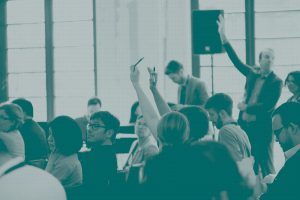Faces of Open Government: Anabel Cruz
Rostros del Gobierno Abierto: Anabel Cruz
Anabel Cruz, Founder and Director of the Communications and Development Institute in Uruguay, became the civil society co-chair of the Open Government PartnershipThe Open Government Partnership (OGP) is a multi-stakeholder initiative focused on improving government transparency, ensuring opportunities for citizen participation in public matters, and strengthen... More Steering CommitteeThe Steering Committee is OGP’s executive decision-making body. Its role is to develop, promote and safeguard OGP’s values, principles and interests; establish OGP’s core ideas, policies, and ru... on October 1, 2022. She is joined in her new role by government co-chair Estonia.
Anabel, from Uruguay, has three decades of experience working with civil society in Latin America and globally. She sat down with OGP to share her vision of the Partnership, the role she and Estonia will play in leading OGP into a second decade of open government work, and the challenges reformers across the Partnership need to address.
1. You recently became co-chair of the OGP Steering Committee, representing civil society organizations working to open up their governments. Now that the Partnership looks at you and your counterpart, the Government of Estonia, for leadership, what are you and Estonia focusing on this year?
Let me first tell you that I am really honored and grateful to have been elected as the 2022-2023 civil society OGP Steering Committee co-chair, and to be able to cooperate with Estonia, the government co-chair, a vibrant and tech-savvy democracy. The preparatory process of our co-chair agenda has been a first step in realizing co-creation is core to policy-making, which we aim to achieve as a crosscutting characteristic of our co-chair year.
When I was elected as co-chair, I proposed to focus on three intertwined strategic dimensions of open government: defending civic space; localizing OGP actions; and promoting an accountable and resourced civil society. The co-chair agenda that we have agreed with the Government of Estonia has indeed incorporated these priorities, and given them an integrated perspective with other crucial open government topics. We aim to support OGP Local and the joint work of local leaders to develop recommendations on action, governance, and innovation. At the same time, our co-chair agenda includes supporting civil society organizations in their efforts to promote their resourcing, accountability, and functioning. It is crucial to find opportunities for the community and civil society leaders that support efforts around sustaining leadership, innovation, and resilience, particularly in moments of crisis.
2. You will lead the development and begin the implementation of the 2023-2028 OGP Strategy. Why is this important and what do you think will come out of it?
The OGP strategy is indeed a global action planAction plans are at the core of a government’s participation in OGP. They are the product of a co-creation process in which government and civil society jointly develop commitments to open governmen..., and the co-chair agenda is explicit in its goal to mobilize and energize the global open government community and strengthen political support for the strategy. On the one hand, OGP needs to respond to opportunities and challenges in a fast-evolving context at the local, national, and global levels.. OGP needs and wants to be extremely relevant after its first decade: open government values and approaches remain current and vital, but OGP should have a more strategic focus in its second decade to achieve greater impact. If we co-create that focus with -and receive feedback from – diverse stakeholders, the strategy will respond to the needs of those that OGP wants to serve.
As co-chairsThe leadership of the Steering Committee is made up of four co-chairs who provide strategic guidance and support to advance OGP’s overarching priorities. Co-Chairs serve two-year terms beginning on ..., we will support community consultations and dialogues around the strategy and also harness political support for the strategy before the strategy is submitted for the Steering Committee’s consideration. We also aim to leverage a high level OGP summit in Tallinn, Estonia in 2023, which will be nurtured by a fresh strategy.
3. An important part of your co-chair agenda is elevating the voices of civil society and supporting their efforts for greater sustainability and resiliency to meaningfully engage in open government efforts. Why is it important and what can the open government community do to support those efforts?
Civil society participation is basic in the theory of change of OGP, and it is part of its DNA. We should be reminded that one of the initial and foundational postulates of OGP was to create space for civil society leaders to work on an equal footing with reformers inside government and to make government work better for and with the people. OGP aimed from its very beginning to give civil society a seat at the table, not only to monitor public policies but also to listen to, submit and debate proposals, and advocate for their priorities.
Even in its first decade, civil society voices in OGP have become stronger and more influential, there is still a long way to go. Civil society organizations engage in the OGP process in different fora, participate in its governance, and help to co-create, implement, and monitor action plans. To play a relevant role, and to make sure that citizens’ voices are heard and taken seriously by decision-makers, civil society organizations must be strong, have access to resources, and practice what they preach in terms of transparencyAccording to OGP’s Articles of Governance, transparency occurs when “government-held information (including on activities and decisions) is open, comprehensive, timely, freely available to the pub... More and accountability. To monitor public policies and hold the government accountable, civil society is expected to lead by example. An open state also includes civil society, and we need to start talking about “open civil society”. OGP and all stakeholders involved in open government should identify ways and mechanisms for civil society organizations to increase their resources without compromising their autonomy. Likewise, it is time to acknowledge and support voluntary civil society efforts to build on existing good practices and standards in civil society-led self-regulation, transparency, and accountability mechanisms, to enable their active and independent participation in open government reforms.
4. You are a fierce advocate for broader and stronger civic space worldwide. We see it eroding in many countries around the world, including OGP countries. What can we do to stop this worrying trend and what aspect of civic space should we focus on?
It is clear that if civic space is not open and enabling, the work that OGP wants to promote cannot be realized. Civil liberties – basic freedoms of expression, association, and assembly – are under threat across the world, and some governments used the pandemic as an opportunity to introduce or implement additional restrictions on civic freedoms. Those conditions are essential to accomplish OGP’s mission.
Shrinking civic space is often a direct result of authoritarian regimes’ inability to accept dissent and civil society’s important role to hold power to account. OGP has the opportunity to work with international, national and local actors, from both the public and private sectorGovernments are working to open private sector practices as well — including through beneficial ownership transparency, open contracting, and regulating environmental standards. Technical specificat... More, and counteract shrinking space at different levels and modalities. Even OGP national members do not show good civic space performance, but national plans have included few civic space commitments. More robust plans in terms of civic space and protection of human rightsAn essential part of open government includes protecting the sacred freedoms and rights of all citizens, including the most vulnerable groups, and holding those who violate human rights accountable. T... and human rights defenders can help to revert these negative trends.
Anabel Cruz, fundadora y directora del Instituto de Comunicaciones y Desarrollo de Uruguay, se convirtió en la copresidenta de la sociedad civil del Comité Directivo de la Alianza para el Gobierno Abierto el 1 de octubre de 2022. En su nuevo cargo, se une a ella el gobierno de Estonia como copresidente de gobierno.
Anabel, de Uruguay, tiene tres décadas de experiencia trabajando con la sociedad civil en América Latina y alrededor del mundo. Se sentó con OGP para compartir su visión de la Alianza, el papel que ella y Estonia desempeñarán para llevar a OGP a una segunda década de trabajo de gobierno abierto y los desafíos que deben abordar las personas reformadoras que forman parte de la Alianza.
1. Recientemente te convertiste en copresidenta del Comité Directivo de OGP, en representación de organizaciones de la sociedad civil que trabajan para abrir sus gobiernos. Ahora que la Alianza los mira a ti y al Gobierno de Estonia, en busca de liderazgo, ¿en qué se están enfocando este año?
Primero, permítanme decirles que me siento realmente honrada y agradecida de haber sido elegida copresidenta del Comité Directivo de OGP de la sociedad civil 2022-2023, y de poder cooperar con Estonia, un país vibrante y tecnológico en términos de democracia inteligente. El proceso preparatorio de nuestra agenda de copresidencia ha sido un primer paso para darnos cuenta de que la cocreación es fundamental para la formulación de políticas, lo que pretendemos lograr como una característica transversal de nuestro año de copresidencia.
Cuando me eligieron como copresidenta, propuse centrarme en tres dimensiones estratégicas entrelazadas del gobierno abierto: defender el espacio cívico; localizar las acciones de OGP; y promover una sociedad civil responsable y dotada de recursos. La agenda de copresidencia que hemos acordado con el Gobierno de Estonia ha incorporado estas prioridades y les ha dado una perspectiva integrada con otros temas cruciales de gobierno abierto. Nuestro objetivo es apoyar a OGP Local y el trabajo conjunto de las y los líderes locales para desarrollar recomendaciones sobre acción, gobernanza e innovación. Al mismo tiempo, nuestra agenda de copresidencia incluye apoyar a las organizaciones de la sociedad civil en sus esfuerzos por promover sus recursos, responsabilidad y funcionamiento. Es crucial encontrar oportunidades para la comunidad y los líderes de la sociedad civil que apoyen los esfuerzos para mantener el liderazgo, la innovación y la resiliencia, particularmente en momentos de crisis.
2. Dirigirán el desarrollo y comenzarán la implementación de la estrategia 2023-20 28 OGP. ¿Por qué es esto importante y qué crees que saldrá de ello?
La estrategia de OGP es de hecho un plan de acción global, y la agenda de la copresidencia es explícita en su objetivo de movilizar y energizar a la comunidad global de gobierno abierto y fortalecer el apoyo político para la estrategia. Por un lado, OGP necesita responder a las oportunidades y desafíos en un contexto de rápida evolución a nivel local, nacional y global. OGP necesita y quiere ser extremadamente relevante después de su primera década: los valores y enfoques de gobierno abierto siguen siendo actuales y vitales, pero OGP debe tener un enfoque más estratégico en su segunda década para lograr un mayor impacto. Si co-creamos ese enfoque con – y recibimos retroalimentación de – diversas partes interesadas, la estrategia responderá a las necesidades de quienes OGP quiere servir.
Como copresidentes, apoyaremos las consultas y los diálogos comunitarios en torno a la estrategia y también aprovecharemos el apoyo político para la estrategia antes de que la estrategia se presente para la consideración del Comité Directivo. También apuntamos a aprovechar la cumbre de OGP en Tallinn, Estonia en 2023, que se nutrirá de una nueva estrategia.
3. Una parte importante de la agenda es elevar las voces de la sociedad civil y apoyar sus esfuerzos para una mayor sostenibilidad y resiliencia para participar de manera significativa en los esfuerzos de gobierno abierto. ¿Por qué es importante y qué puede hacer la comunidad de gobierno abierto para apoyar esos esfuerzos?
La participación de la sociedad civil es básica en la teoría de cambio de OGP y forma parte de su ADN. Debemos recordar que uno de los postulados iniciales y fundacionales de OGP fue crear un espacio para que los líderes de la sociedad civil trabajaran en igualdad de condiciones con las personas reformadoras dentro del gobierno y hacer que el gobierno funcione mejor para y con la gente. OGP tuvo como objetivo desde sus inicios dar a la sociedad civil un lugar en la mesa, no solo para monitorear las políticas públicas, sino también para escuchar, proponer y debatir propuestas, y abogar por sus prioridades.
Aunque en su primera década, las voces de la sociedad civil en OGP se han vuelto más fuertes e influyentes, todavía queda un largo camino por recorrer. Las organizaciones de la sociedad civil se involucran en el proceso de OGP en diferentes foros, participan en su gobernanza y ayudan a co-crear, implementar y monitorear planes de acción. Para desempeñar un papel relevante y asegurarse de que las voces de la ciudadanía sean escuchadas y tomadas en serio por quienes toman las decisiones, las organizaciones de la sociedad civil deben ser fuertes, tener acceso a los recursos y practicar lo que predican en términos de transparencia y rendición de cuentas. Para monitorear las políticas públicas y hacer que el gobierno rinda cuentas, la sociedad civil debe liderar con el ejemplo. Un estado abierto también incluye la sociedad civil, y tenemos que empezar a hablar de “sociedad civil abierta”. OGP y todas las partes interesadas involucradas en el gobierno abierto deben identificar formas y mecanismos para que las organizaciones de la sociedad civil aumenten sus recursos sin comprometer su autonomía. Del mismo modo, es hora de reconocer y apoyar los esfuerzos voluntarios de la sociedad civil para aprovechar las buenas prácticas y estándares existentes en los mecanismos de autorregulación, transparencia y rendición de cuentas liderados por la sociedad civil, para permitir su participación activa e independiente en las reformas de gobierno abierto.
4. Eres una ferviente defensora de un espacio cívico más amplio y más fuerte en todo el mundo. Lo vemos erosionar en muchos países del mundo, incluidos los países de OGP. ¿Qué podemos hacer para detener esta preocupante tendencia y en qué aspecto del espacio cívico debemos centrarnos?
Está claro que si el espacio cívico no está abierto y habilitado, el trabajo que OGP quiere promover no se puede realizar. Las libertades civiles (libertades básicas de expresión, asociación y reunión) están amenazadas en todo el mundo, y algunos gobiernos aprovecharon la pandemia como una oportunidad para introducir o implementar restricciones adicionales a las libertades cívicas. Esas condiciones son esenciales para cumplir la misión de OGP.
La reducción del espacio cívico es a menudo un resultado directo de la incapacidad de los regímenes autoritarios para aceptar la disidencia y el importante papel de la sociedad civil para hacer que el poder rinda cuentas. OGP tiene la oportunidad de trabajar con actores internacionales, nacionales y locales, tanto del sector público como privado, y contrarrestar la reducción del espacio en diferentes niveles y modalidades. Incluso los miembros nacionales de OGP no muestran un buen desempeño, pero los planes nacionales han incluido pocos compromisos de espacio cívico. Planes más sólidos en términos de espacio cívico y protección de los derechos humanos y de los defensores de los derechos humanos pueden ayudar a revertir estas tendencias negativas.
Comments (2)
Leave a Reply
Related Content

2022 – 2023 OGP Co-Chair Agenda: Government of Estonia and Anabel Cruz
Explore the Government of Estonia and Anabel Cruz's priorities to energize the community, host a successful OGP summit, incentivize collection action, and support civil society's resiliency and sustainability.

Creating OGP’s Future Together – Strategic Planning 2023-2028
Help co-create OGP's new strategy. This page is your go-to resource for all the materials you need to host and join conversations and share your views on how OGP can…

Creating OGP’s Future Together – Join the Online Discussions
Share your views on the key questions and issues we need to think about on the future of open government and OGP. Every month we will be launching a new…


Gladys Estela Riveros Rojas Reply
Objetivo de movilizar y energizar a la comunidad mundial de gobierno abierto y fortalecer el apoyo político a la estrategia.
Como copresidente es acompañar a los lideres de las comunidades, sumar bienestar para todos y sobre todo su presencia activa.
Anabel Cruz Reply
Hola Estela. Estoy muy de acuerdo contigo. Como copresidenta espero poder apoyar ciudadanas y ciudadanos, organizaciones, movimientos y redes, a las personas líderes de todas esas organizaciones de la comunidad, para que puedan abrirse espacios para su participación activa. Una sociedad abierta es un lema que espero se vaya haciendo realidad: una sociedad civil fuerte, responsable, dotada de recursos, que pueda sumar bienestar a la vida de sus ciudades, países, regiones. Muchas gracias
Anabel